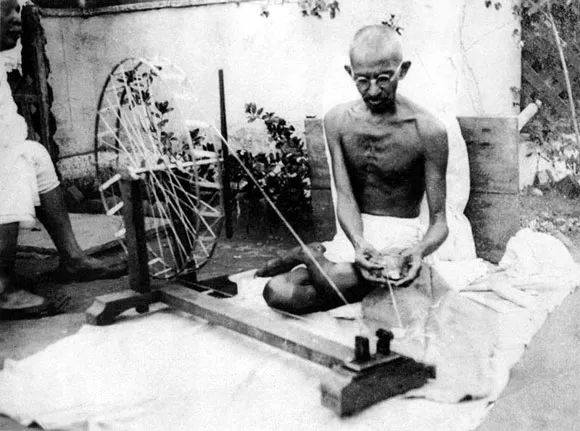30 pearls of wisdom from Mahatma Gandhi to inspire every social entrepreneur
Mahatma Gandhi was born on October 2, 1869. Tomorrow we celebrate his 144th birthday. He maybe no more, but his legacy lives on, more important now than ever before. Gandhi was a man whose thoughts were wise, well-worded and relevant to almost anybody who ever heard them. If he wasn’t fighting for our freedom, maybe he would have become a famous philosopher or saint.
His quotes are famous globally, and most of you would be familiar with them, but reading them again only makes them more powerful and personal. As a social entrepreneur, you go through many ups and downs, there are moments of doubt and indecision. We have scoured around for Gandhi’s best quotes, and found 30 of the most enlightening, to inspire you every day of your social entrepreneurship journey.
Dwell on the words and imbibe them to the fullest.

1) On believing in yourself or being different:
“First they ignore you, then they laugh at you, then they fight you, then you win.”
2) On humanity:
“You must not lose faith in humanity. Humanity is an ocean; if a few drops of the ocean are dirty, the ocean does not become dirty.”
3) On happiness and harmony:
“Happiness is when what you think, what you say, and what you do are in harmony.”
4) On changing the world:
“You must be the change you want to see in the world.”
5) On maintaining cordial relations:
“I suppose leadership at one time meant muscles; but today it means getting along with people.”
6) On teamwork:
“A small body of determined spirits fired by an unquenchable faith in their mission can alter the course of history.”
7) On gentleness:
“In a gentle way, you can shake the world.”
8) On serving others:
“The best way to find yourself is to lose yourself in the service of others.”
9) On action:
“Action expresses priorities.”
10) On the mind:
“You can chain me, you can torture me, you can even destroy this body, but you will never imprison my mind.”
11) On human will:
“Strength does not come from physical capacity. It comes from an indomitable will.”
12) On poverty:
“Poverty is the worst form of violence.”
13) On women:
“Man can never be a woman’s equal in the spirit of selfless service with which nature has endowed her.”
14) On the voice within:
“The only tyrant I accept in this world is the ‘still small voice’ within me. And even though I have to face the prospect of being a minority of one, I humbly believe I have the courage to be in such a hopeless minority.”
15) On doing good:
“To give pleasure to a single heart by a single act is better than a thousand heads bowing in prayer.”
16) On following our dreams:
“To believe in something, and not to live it, is dishonest.”
17) On fulfilling potential:
“The difference between what we do and what we are capable of doing would suffice to solve most of the world’s problem.”
18) On pursuit of the material:
“Increase of material comforts, it may be generally laid down, does not in any way whatsoever conduce to moral growth.”
19) On discontent:
“Healthy discontent is the prelude to progress.”
20) On quality versus quantity:
“It is the quality of our work which will please God and not the quantity.”
21) On fear over cowardice:
“Fear has its use but cowardice has none.”
22) On interdependence:
“Interdependence is and ought to be as much the ideal of man as self-sufficiency. Man is a social being.”
23) On common sense:
“Common sense is the realised sense of proportion.”
24) On wants and contentment:
“Man falls from the pursuit of the ideal of plan living and high thinking the moment he wants to multiply his daily wants. Man’s happiness really lies in contentment.”
25) On freedom and amenities of life:
“To deprive a man of his natural liberty and to deny to him the ordinary amenities of life is worse then starving the body; it is starvation of the soul, the dweller in the body.”
26) On serving and being served:
“Service which is rendered without joy helps neither the servant nor the served. But all other pleasures and possessions pale into nothingness before service which is rendered in a spirit of joy.”
27) On lifelong learning:
“Live as if you were to die tomorrow. Learn as if you were to live forever.”
28) On making mistakes:
“Freedom is not worth having if it does not connote freedom to err. It passes my comprehension how human beings, be they ever so experienced and able, can delight in depriving other human beings of that precious right.”
29) On the futility of worry:
“There is nothing that wastes the body like worry, and one who has any faith in God should be ashamed to worry about anything whatsoever.”
30) On thinking for ourselves:
“Those who know how to think need no teachers.”







